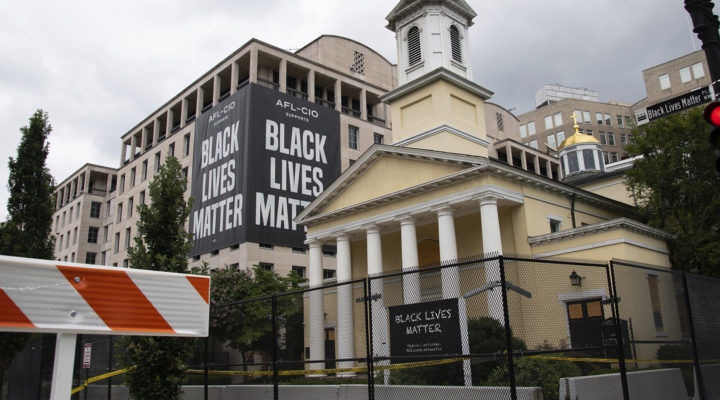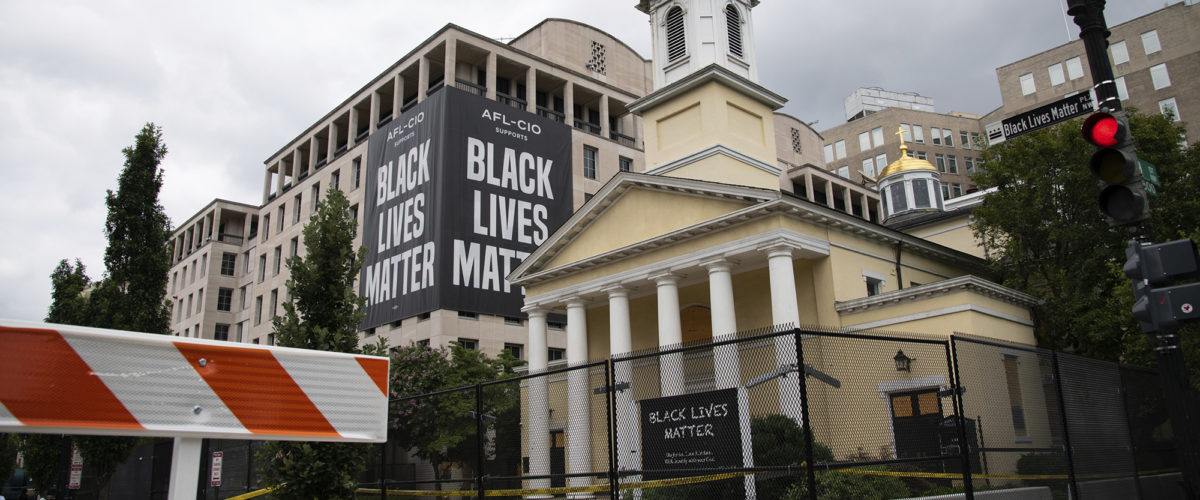Social and racial justice activists should envision rubber bands when frustrated, fearful or angry about the “perilous times” currently facing the movements for systemic change in the U.S., Black Lives Matter co-founder Alicia Garza said.
“What happens with rubber bands? Rubber bands contract. And we are in a moment of contraction. And it’s normal,” Garza said during a March 23 hybrid lecture and discussion session hosted by the Episcopal Divinity School at Union Theological Seminary in New York City.

Alicia Garza
It’s tempting and understandable to fall into despair during periods of contraction, said Garza, who left Black Lives Matter in 2017 to become principle with the Black Futures Lab, a think tank focused on Black political influence.
“Sometimes when people experience these moments, you feel like, ‘What did I do all that work for? This country cannot be changed.’ I feel that way sometimes too. … But the reality is that history expands and contracts.”
Garza also cautioned against underestimating the enormity and strength of the political and cultural forces arrayed against racial and LGBTQ equality in the United States. “I’m not trying to give false hope here. I’m trying to say this is how change happens. Change expands and contracts and our job inside of that is to stay steady.”
Garza was invited to Union to discuss her 2020 book, The Purpose of Power: How We Come Together When We Fall Apart, which has been required reading for seminarians at Union during the current semester.
But her remarks also leaned heavily into themes of avoiding despair in the face of external divisions and conflicts within social justice movements. She offered guidance for staying motivated and positive through adversity.
“Contractions wouldn’t happen if those expansions were not so scary to the status quo.”
“Stay focused. Stay hopeful. Stay purposeful. Stay committed. And stay joyful. Contractions wouldn’t happen if those expansions were not so scary to the status quo,” she said. “There would not be backlash if our ideas and practice were not so powerful.”
The 2013 launch of Black Lives Matter came during a period of contraction that included the high-profile, racially motivated murders of Trayvon Martin in Florida, Michael Brown in Missouri and others. The resulting wave of protests were followed by a period of expansion that included support for racial justice and police reforms. American corporations and some members of Congress openly supported racial justice.
“We thought transformation was around the corner and we were going to see it and feel it in our lifetimes,” she recalled. “You couldn’t have told us anything different. And then?”
And then the emergence of the present contraction that began with the run-up to the 2016 presidential election and with it accusations that protests against anti-Black police violence were led by subversives who had gone too far in their advocacy for racial and economic justice.
But protests over the more recent murders, including that of George Floyd, have not gone too far, she said. “Taking life, that’s going too far. Beating and jailing somebody because they don’t believe the same things that I do, that’s too far. But expressing a vision of what a society could look like without surveillance, oppression, violence, injustice, that’s not too far. There’s nothing too far about dreaming. The question is always: How do we get there?”
The achievement of previous struggles demonstrates it starts with a dream, she said. “Those of you who identify as women and who are wearing pants, at some point in time that was deemed impossible. Those of you who love someone of the same gender, at one time that was considered impossible.”
Garza advised against becoming overly fixated on who wins the 2024 presidential election because elections do not guarantee progress: “The question is how many people can you get to take action … in a context where people feel like their dreams are unattainable, where people feel like they don’t have a government that represents them.”
“The question is how many people can you get to take action.”
Taking action, and convincing others to take action, must derive from a sense of responsibility for the well-being of others, she explained. “We are moving in this country to a point where we are encouraging people not to feel that way, and to be unabashed about it. Oh, women can’t make decisions over their own bodies? That’s their problem. Don’t worry about that. Oh, Black people are being beaten and murdered on camera? That’s their problem.”
The weapon being used against gender and racial justice today is the villification of wokeness to sew discontent among those who know it stands for justice, she said. “There are all kinds of decisions being made about us, without us. And those decisions are intended to separate us and divide us. Talking about examining and uplifting racial justice is not divisive. It’s the amnesia that’s divisive. It’s the silence that’s divisive.”
Organized action is the way to stand up for the marginalized, Garza said. “We have to teach each other how to be the superheroes in our own stories and not wait for somebody else to do it.”
Related articles:
Tony Evans misses the mark and misrepresents history with his Kingdom Race Theology | Opinion by Wendell Griffen


